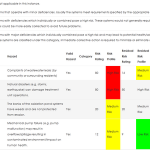KwaZulu Natal Municipalities Water Safety Planning on the rise

Subsequent to the profiling of the Water Safety Plans (WSP) within the third addition of the WHO Guidelines for Drinking Water Quality (2004) and its inclusion into the Blue Drop Certification programme, WSPs have become an integral part of water risk assessment and management within Water Services Institutions (WSI).
WSIs are seeing the benefits of the drafting of WSPs as they provide a mechanism to highlight priority risks which can be submitted to councils for budgeting and implementation.
Emanti, through is knowledge and experience, were recently appointed to co-ordinate the drafting of WSPs for a number of KwaZulu Natal municipalities, including: (1) Uthukela District Municipality, (2) Msunduzi Municipality, (3) Newcastle Municipality and (4) The City of uMhlathuze.
An integrated approach allowed for the regular interaction of the project team which comprised of technical and management officials from the WSIs as well as Water Service Providers, (where applicable). Acknowledging that WSPs need to incorporate the entire value chain from catchment to consumer, site inspections with the WSIs and Water Service Providers were undertaken for each water supply system.
Following completion of the preliminary risk assessments with associated prioritization using the Water Research Commission (WRC) developed water safety plan tool, workshops were conducted with the WSIs and WSPs technical and management officials to ensure that all applicable risks were captured and that Control Measure Validation was undertaken. Control Measure Validation allowed for capturing of responsibilities, estimated budgets and estimated timelines of the prioritized risks. Once the control measures are implemented a Residual Risk Rating exercise can be undertaken to ascertain the effectiveness of the control measures in lowering of the risk level.
With the launch of the 2011 SANS 241, risk based monitoring was highlighted as key function of water quality management and this was also incorporated within the WSP process. Firstly a determinand risk assessment was conducted based on full SANS analysis of the WSIs and secondly each risk was assigned a risk specific determinand.
Together with fulfilling the guidelines for a successful WSP, Emanti also assisted WSIs in the drafting of supporting and monitoring programmes to ensure the successful implementation of the WSP. Special consideration was given to Incident Management Protocols, which also form a critical part of the now Blue Water Services Audits of DWA.
Emanti is observing the benefits to the municipal sector in providing a WSP tool that WSIs can utilize themselves in the drafting and implementation of successful WSPs. The WRC should be commended for their foresight in developing such a worthwhile tool.










